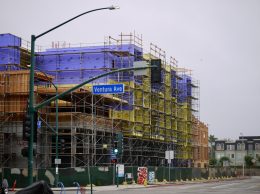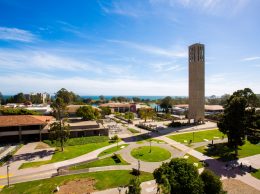Hertel partner files $128M bankruptcy
IN THIS ARTICLE
- Real Estate Topic
- Marlize van Romburgh Author
By Marlize van Romburgh Friday, October 29th, 2010
Almost two years after Ventura-based developer R.W. Hertel & Sons was forced into bankruptcy by its creditors, one partner is left holding the bag. Bob Fowler filed one of the largest personal bankruptcies in tri-county history on Sept. 26, listing $127.6 million in debts.
Of those liabilities, $105.6 million are personal guarantees Fowler made on business loans, according to his bankruptcy filing.
“In the development industry, one has to put their personal assets on the line,” he told the Business Times in an Oct. 25 interview.
Many of the debts listed in his Chapter 7 bankruptcy are essentially the same debts that Hertel & Sons listed when it filed for involuntary Chapter 7 bankruptcy in January 2009, Fowler said.
“I’ve been working for the last two years to mitigate as much of it as I could,” he said.
Fowler worked for Hertel & Sons from 1993 until it collapsed in 2008. The company, controlled by Fowler and business partner Ron Hertel, built more than 1,100 homes in the Tri-Counties in the housing market’s heyday, and had another 1,000 planned when the company crumbled. At one point, it employed about 100 people in the region.
But Hertel and Fowler’s business unraveled when the residential real estate market turned south and the weight of various luxury acquisitions — including charter planes, vineyards and a horse ranch — became too much.
“It’s been a pretty tough time for everybody in this industry,” Fowler said. “The whole industry burnt down over things that I had no control over; all that subprime mortgage stuff that was driving values in the wrong direction. … I’ve taken a personal beating.”
When lenders foreclosed on Hertel & Sons’ properties, “they didn’t end up getting very much on it,” Fowler said. So the banks turned to the loan guarantors to try to shake out the rest.
“Not only I but Ron [Hertel] also, and in some cases other partners, made personal guarantees,” Fowler said.
A message left on Hertel’s cell phone requesting a comment for this story was not returned. He does not appear to have filed for personal bankruptcy.
Calls to some of Fowler’s largest creditors were also not returned by press time.
Fowler told the Business Times in February 2009 that he realized he should have done things differently. “I should have liquidated, put it all into bonds and gone home,” he said then.
Instead, he made personal guarantees on $105.6 million in loans to his various development corporations and racked up $106,000 in business credit card expenses, according to bankruptcy filings.
“I’ve been working with a lot of these lenders to dispose with these assets as profitably as possible,” Fowler said in his recent interview. “Much of it has been paid back.”
He said many of the liabilities listed in his bankruptcy schedule are exaggerated, listing the original loan amounts and not accounting for what’s been recovered through foreclosure.
“I listed everything out of caution,” he said.
Fowler also owes $1.5 million in federal and state taxes and tax fees, according to his bankruptcy filing. His assets, totaling $4.8 million, include his personal residence in Santa Margarita, four rental houses and a vacant lot.
William Winfield, a bankruptcy attorney and partner at Oxnard-based Nordman Cormany Hair & Compton, said it’s not unusual for banks to require personal guarantees from developers, especially since many set up specific business entities for individual projects. “Developers often compartmentalize projects that way,” Winfield said.
He would not comment specifically on Fowler’s situation, noting that his law firm at one time represented R.W. Hertel & Sons, but he said, “There’s been a lot of litigation surrounding developers and personal guarantees.”
Hertel and Fowler testified during Hertel & Sons’ corporate bankruptcy in 2009 that they pumped in money from their personal accounts in an attempt to keep the company afloat during its last few years.
Hertel also testified that personal pursuits, including a thoroughbred horse farm and 130-foot yacht, may have drawn money from the company. “Hertel Farms at one time had thoroughbreds,” Hertel said at a July 2009 trustee’s hearing. “R.W. Hertel & Sons may have paid some of its bills, but I’m sure it was all reimbursed.”
The bankruptcy trustees appointed to Fowler’s case — first Sandra McBeth, who was the trustee charged with digging up assets from R.W. Hertel & Sons, and then David Farmer — each declined to preside over hearings in the case or withdrew, citing conflicts of interest, according to court documents.
Bankruptcy filings do not yet show that a new trustee has been appointed to Fowler’s case, although a Nov. 8 meeting of his creditors is scheduled.
Are you a subscriber? If not, sign up today for a four-week FREE trial or subscribe and receive the Book of Lists free with your purchase.










